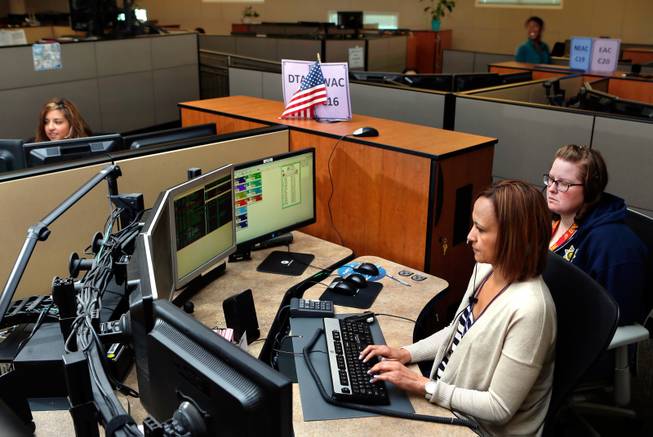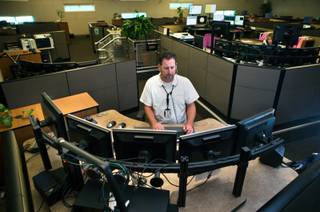
A seasoned operator continues to train a newer one about the communications room for 911 operators within the LVMPD dispatch center on Friday, April, 10, 2015.
Tuesday, May 10, 2016 | 4:18 p.m.
One caller complained of a stubbed toe. Another couldn’t stop sneezing.
Someone else said a family member — later determined to be a dog — was having trouble breathing.
These are examples of non-emergency situations clogging up local 911 lines and potentially creating longer response times to real life-and-death situations, Clark County Fire Department Chief Greg Cassell said today.
As summer approaches, bringing a surge in emergency calls because of the heat and more visitors to the area, first responders are on a mission to teach community members when — and when not — to call 911.
Cassell appeared at Veterans Tribute Career and Technical Academy to unveil a series of public-service announcements, some of which were made by students, that will help educate the public about appropriate emergency calls. Students in the school’s 911 program, which preps them for careers in the field, researched the problem and then created, filmed and edited the announcements.
The informational videos will air on Clark County Television (Channel 4) and perhaps other local stations, officials said.
Calls for service to the Clark County Fire Department increased by 4.8 percent over the last decade, Cassell said. Last year, the department received 152,437 calls — of which 2,906 were fire calls and 142,056 were for medical emergencies. The remaining 7,475 did not fit in those categories.
Cassell said people should call 911 if they have life-threatening fire, police or medical emergencies. Other situations should be reported to 311, the non-emergency line.
It may seem like common sense — or a flashback to elementary school when 911 etiquette is taught — but Cassell said a frustrating amount of people dial 911 for outlandish reasons, such as complaints about noisy neighbors, traffic tickets and minor colds.
“How could you possibly think that’s an emergency?” Cassell said.
County officials hope the announcements deter the problem, freeing up dispatchers and first responders to help people in real emergency situations.
A reduction in unnecessary calls should save money, too. Cassell said dispatching a fire unit costs $300 per hour, and the cost of a private ambulance is $150 per hour.
Local ambulance companies and social service agencies have started working with people who frequently call 911 to identify health issues and other factors that may be contributing to the problem, Cassell said. They then provide resources and help to those callers to prevent them from needing to summon emergency aid all the time.


Join the Discussion:
Check this out for a full explanation of our conversion to the LiveFyre commenting system and instructions on how to sign up for an account.
Full comments policy